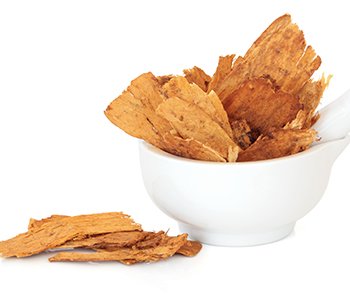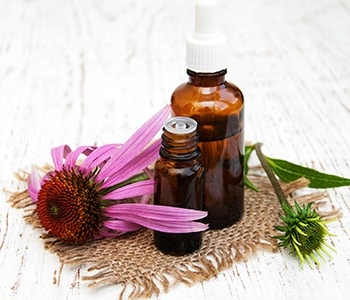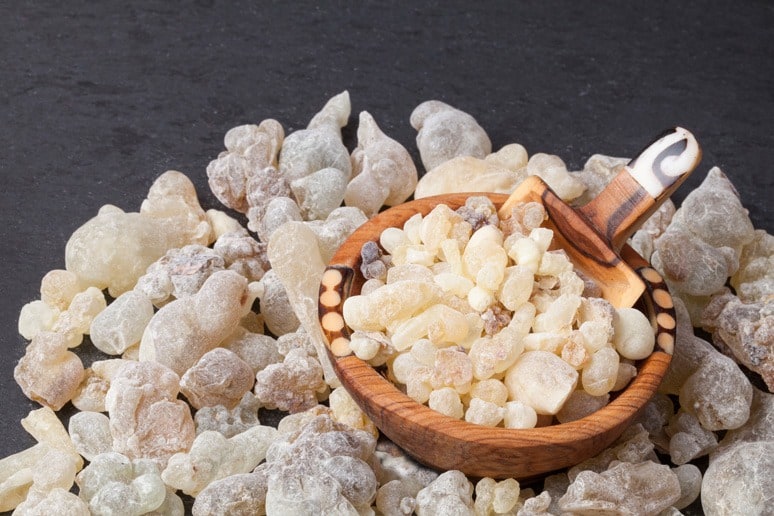Top 5 Herbs That Help Support a Healthy Immune System
In a hurry? Click here to read the Article Summary...
Have you ever stopped to consider what kind of shape we’d all be in if our bodies didn’t have the innate ability to protect us against disease? We’d get really sick and tired of being sick and tired all the time – that’s for sure! Having a vibrant, healthy immune system is something that most of us take for granted, especially during our younger years when it’s usually functioning at its best. But as our body grows older, so does our immune systems – a sign that it’s probably time to give it a little extra TLC.
While supporting a healthy immune system is something that everyone should be doing even from a young age, it’s especially important for folks who are getting up there in years. This is usually about the time when things start to get a little glitchy and break down; a common part of the aging process, unfortunately. But the good news is that you can help slow down the damage – or in some cases even reverse it – with proper nutritional and supplemental intervention.
If your current plan to age gracefully includes eating healthy, staying hydrated, de-stressing, and getting plenty of rest, you’re already on the right track. But what if you could take things to a whole new level by incorporating the best of what nature has to offer into your daily regimen for added support for a strong, healthy immune system?
The good news is you can, and the following five herbs will help you do just that… without breaking the bank!
Healthy Immune System Support #5 – Astragalus
 A prominent member of the legume or bean family, astragalus (astragalus membranaceus or astragalus mongholicus) has deep roots in Traditional Chinese Medicine (TCM).
A prominent member of the legume or bean family, astragalus (astragalus membranaceus or astragalus mongholicus) has deep roots in Traditional Chinese Medicine (TCM).
For many thousands of years, civilizations both past and present have used this powerful adaptogenic herb to support wellness on a variety of fronts, with perhaps its most well-known benefit being in the area of immune support.
Astragalus contains more than 200 active constituents that lend to its therapeutic efficacy. Three of these – saponins, flavonoids, and polysaccharides – are particularly noteworthy as having received special attention in the scientific literature for their pronounced impact on health and well-being.
Pharmacological studies suggest that saponins, flavonoids, and polysaccharides, as well as the hundreds of other synergistic compounds found in astragalus, work together at the systemic level to help support the body in a variety of ways. One of the most significant ways involves providing active protection against physical damage caused by free radicals, toxins, viruses, and inflammation [1].
Saponins
Considered to be the primary chemical constituent class found in astragalus, saponins are naturally-occurring plant phytochemicals that studies suggest can help support healthy cholesterol levels, ward off abnormal cell growth, and provide an extra boost to the immune system.
According to research published in 2011, Astragalus just so happens to be the world’s richest known source of cycloartane-type saponins, which have been shown to exhibit strong cardiotonic, hypocholesteremic, antidepressive, antiblastic, and immunomodulatory properties [2].
Flavonoids
These colorful antioxidant plant pigment compounds have been shown to help facilitate proper cell signaling while scavenging inflammation-causing free radicals from cellular tissue. Their benefits extend beyond this to the immune system as well, as flavonoids are arch enemies to both cancer and heart disease, as demonstrated in numerous scientific studies [3].
Polysaccharides
Also known as glycans, polysaccharides are molecularly-bonded simple sugars that serve as energy stores in the body. Because of this special molecular bond, polysaccharides are technically complex carbohydrates that serve as the body’s primary source of energy. Evidence suggests that polysaccharides possess powerful antimicrobial, antiviral, and anti-inflammatory properties that further lend to their bioactive nature of astragalus [4].
Healthy Immune System Support #4 – Echinacea
 A wildly popular folk remedy for treating the common cold, echinacea (Echinacea purpurea), extracted from the Eastern Purple Coneflower, is one of the few immune-supportive herbs that’s actually native to North America.
A wildly popular folk remedy for treating the common cold, echinacea (Echinacea purpurea), extracted from the Eastern Purple Coneflower, is one of the few immune-supportive herbs that’s actually native to North America.
The Great Plains Indian tribes long used the flowers, leaves, and roots of echinacea to make herbal tinctures and other botanical therapeutics before this herb ever caught on in modern times as an effective natural alternative to antibiotics and other drug-based medications.
Every part of the echinacea plant seems to present its own unique therapeutic flavor. The roots tend to contain the highest concentration of volatile oils, while the flowers and leaves contain higher amounts of polysaccharides. While polysaccharides are more closely associated with immune function, a great many of echinacea’s other constituents are also said to have an immuno-stimulating effect, including the plant’s flavonoids and essential oils.
In Germany, the above-ground portions of the echinacea plant are officially approved as a natural remedy for treating urinary and upper respiratory tract infections, as well as slow-healing wounds and colds [5].
Echinacea is also widely used to fight back against influenza, with the largest clinical trial ever conducted on the herb suggesting that it exerts a profoundly positive impact on a weakened immune system [6].
Healthy Immune System Support #3 – Frankincense
The origins of its treasured use tend to center around Northern Africa and the Middle East. But frankincense (Boswellia carterii or Boswellia sacara) is gaining quite the reputation all around the world in modern times as a natural therapeutic with a whole lot of untapped healing potential.
Evidence exists to suggest that frankincense is effective in helping to balance the  mind, body, and soul in truly profound ways that science is only just beginning to fully discover.
mind, body, and soul in truly profound ways that science is only just beginning to fully discover.
Often referred to as olibanum, frankincense is commonly used as a natural remedy to calm stress and anxiety, as well as to manage pain and support an all-around healthy lifestyle free of damaging inflammation. Its essential oils are believed to help facilitate the transmission of messages to the limbic system of the brain, which in turn has a direct impact on promoting optimal function within the central nervous system [7].
Specific to the immune system are the reported benefits of frankincense in enhancing its functionality. Studies also show that frankincense exhibits a powerful antimicrobial effect against harmful bacteria and viruses. It may even be a viable weapon against abnormal cell growth, as numerous trials have demonstrated its pro-apoptotic and anti-proliferative effects [8].
Healthy Immune System Support #2 – Myrrh
Derived from the Arabic word “murr,” which means bitter, myrrh (Commiphora myrrha) has rich historical significance both as an aromatic spice and as a natural remedy for an assortment of ailments. Studies suggest that myrrh has a particular appetite for conditions marked by chronic inflammation. It’s also a powerful detoxifier, helping to rid the body of toxic metals such as lead [9].
The yellowish-orange essential oil extracted from myrrh resin contains two key constituents that to a large extent demarcate its therapeutic efficacy: terpenoids and sesquiterpenes.
Terpenoids
Only in more modern times has this particularly aromatic antioxidant class been identified as having therapeutic significance. Studies show that the terpenoids in myrrh may help to prevent fats and other metabolites in plants against oxidation, and that similar benefits are possible in humans as well [10]. Research has also shown that myrrh terpenoids possess unique anti-inflammatory properties that can help support a well-functioning body [11].
Sesquiterpenes
The “other half” to terpenoids, sesquiterpenes are another class of restorative compounds that can help support a healthy immune system in a variety of ways. The sesquiterpenes specific to myrrh possess powerful antibacterial and antifungal properties that lend to the herb’s reported effectiveness in purification and cleansing [12].
This is why myrrh was commonly used in ancient times to embalm the dead. Sesquiterpenes are also said to be supportive in keeping inflammation at bay, as well as in helping to balance emotions and hormone levels [13].
Healthy Immune System Support #1 – Turmeric
 It’s hard to know where to start with this ancient “golden” spice because, honestly, it does so much.
It’s hard to know where to start with this ancient “golden” spice because, honestly, it does so much.
More than 6,000 peer-reviewed papers confirm that turmeric (Curcuma longa) is a functional food of the highest order.
Specifically, these studies suggest that turmeric can be effectively used to support health in a multitude of ways including to help combat depression, manage pain, and soothe the stomach and gut. Many people also take it to help keep their cholesterol levels in check.
But where science suggests that turmeric may hold the most promise is in the area of inflammation support. Curcumin, the believed-to-be primary active constituent in turmeric, is considered by many to be one of the most potent anti-inflammatory substances known to mankind.
The combined results of many different studies reveal that curcumin can even trump many pharmaceutical drugs with its incredible ability to take on a variety of maladies, including those that affect the blood, brain, heart, gut, and central nervous system [14].
The anti-inflammatory properties of curcumin are further well-documented, showing that this bioactive substance interacts with many different molecular targets associated with inflammation.
One research paper published in 2009 in the journal Alternative Medicine Review stated that “based on early cell culture and animal research, clinical trials indicate curcumin may have potential as a therapeutic agent in diseases such as inflammatory bowel disease, pancreatitis, arthritis, and chronic anterior uveitis, as well as certain types of cancer [15].”
The paper’s author went on to say that:
“Curcumin’s potent anti-inflammatory properties have led to active research on its use for a variety of inflammatory conditions, including postoperative inflammation, arthritis, uveitis, inflammatory pseudotumors, dyspepsia, irritable bowel syndrome, inflammatory bowel disease, pancreatitis, and Helicobacter pylori infection.”
Joint & Muscle Care is a revolutionary supplement that takes three of the strongest inflammation support agents in nature (frankincense, myrrh, and turmeric), and combines them in the same perfect union treasured by the ancients. Available in capsule form or as an essential oil blend.

 Sources:
Sources:
Article Summary
While supporting a healthy immune system is something that everyone should be doing even from a young age, it’s especially important as we age.
You can help slow down the damage – or in some cases even reverse it – with proper nutritional and supplemental intervention.
5 herbs that support a strong, healthy immune system:
- Astragalus
- Echinacea
- Frankincense
- Myrrh
- Turmeric



Do any of these oils or herbs support the kidneys.
Milk Thistle and Turmeric support kidney health